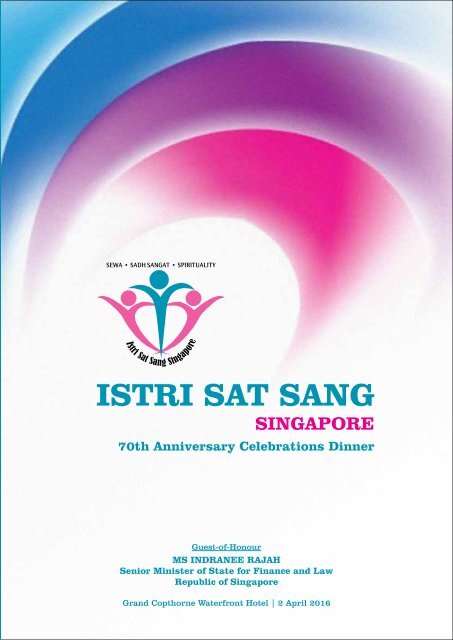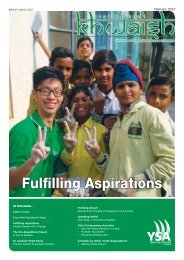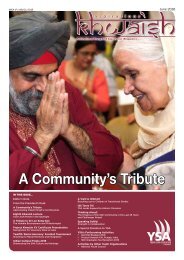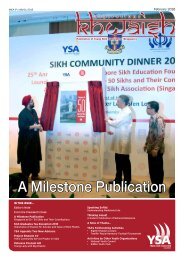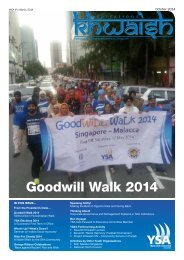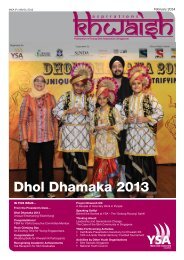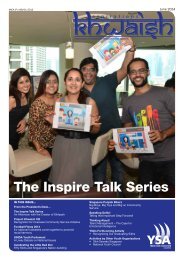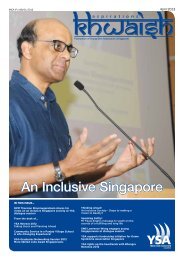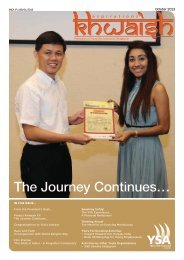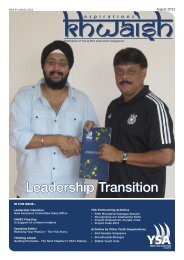ISS-Magazine_v7
You also want an ePaper? Increase the reach of your titles
YUMPU automatically turns print PDFs into web optimized ePapers that Google loves.
ISTRI SAT SANG<br />
SINGAPORE<br />
70th Anniversary Celebrations Dinner<br />
Guest-of-Honour<br />
MS INDRANEE RAJAH<br />
Senior Minister of State for Finance and Law<br />
Republic of Singapore<br />
Grand Copthorne Waterfront Hotel | 2 April 2016
Contents<br />
Foreword 2<br />
Message from Ms Indranee Rajah 3<br />
Senior Minister of State for Finance and Law, Singapore<br />
Message from Mdm Jagir Kaur 4<br />
Chairperson, Istri Sat Sang Singapore<br />
Message from Mr Gurcharan Singh Kesail 5<br />
President, Central Sikh Gurdwara Board, Singapore<br />
<strong>ISS</strong>’ Vision and Mission 6<br />
<strong>ISS</strong>’ Executive Council (2015 to 2017) 7<br />
The Position of Women in Sikhism 8<br />
Tracing the History of <strong>ISS</strong> 9<br />
The Stalwarts of <strong>ISS</strong> 12<br />
The Presidents of <strong>ISS</strong> 17<br />
<strong>ISS</strong>’ Key Initiatives and Programmes<br />
✦ SG25 Celebrations 18<br />
✦ Prayers during SARS Outbreak 19<br />
✦ Visit to Bishan Home for the Intellectually Disabled 19<br />
✦ River Cruise 20<br />
✦ Causeway Vesakhi Celebrations 20<br />
✦ Diwali – Festival of Lights Celebrations 20<br />
✦ Picnic and Healthy Lifestyle Outing 21<br />
✦ Festival of Joy with Musical Performances 21<br />
✦ Teeyan da Mela Celebration 22<br />
✦ Appreciation High Tea 22<br />
✦ Fundraising and Donations 23<br />
✦ Weekly Sat Sangs 23<br />
Unveiling the <strong>ISS</strong> Logo 24<br />
Defining the Future of <strong>ISS</strong> 25<br />
Acknowledgements 28<br />
1
Foreword<br />
Over the 70 years since its inception, Istri Sat Sang Singapore (<strong>ISS</strong>) has played an important function to Sikh women in<br />
Singapore.<br />
As a platform for them to network, socialise, build social support structures and practice their religious and traditional<br />
values, <strong>ISS</strong> has been unprecedented in its reach and relevance to Sikh women here. As with any other organisation<br />
though, milestones also provide an opportune time for reflection. In this regard, <strong>ISS</strong> has progressively leveraged on its<br />
70th anniversary celebrations to both commemorate its history and contributions thus far as well as review its relevance<br />
and chart its new directions.<br />
The need for celebrations is more obvious than the impetus for a review and thus that strategy deserves greater<br />
elaboration in this foreword. To begin with, the roles and profiles of Sikh women in Singapore have evolved significantly<br />
since <strong>ISS</strong> was formed. Sikh women now have generally participated in education and the workforce more than their<br />
predecessors had the opportunity to do so.<br />
The pioneers of <strong>ISS</strong> were often restricted to domestic roles, due largely to the socio-economic status of many Sikh<br />
immigrant families at that time. They therefore required a specific and separate platform for their social and community<br />
involvement needs. This is no longer the case, as the Sikh women of recent times have other platforms for social and<br />
support structures. During the earlier history of <strong>ISS</strong>, Sikh women in Singapore were also largely Punjabi-speaking since<br />
many of them were not educated in other languages. As a result, this would have somewhat hindered their ability to<br />
build significant networks among non-Sikhs, thereby creating a greater need for them to find more opportunities with<br />
fellow Sikh women. <strong>ISS</strong> provided this convenient and comfortable platform. In more recent times though, Sikh women<br />
have become conversant in English and other languages and, with the access they have to non-Sikhs in schools and<br />
workplaces, they have various options to meet their social needs.<br />
Another factor that has had an impact on <strong>ISS</strong> in contemporary times is the proliferation of other platforms where Sikh<br />
women can contribute to, participate in and manage. Within the Sikh community alone, several gurdwaras (Sikh temples)<br />
here have developed their own Istri Sat Sang wings, in addition to ladies wings established by other organisations in<br />
the community. The emergence of other organisations in the community in the last three or four decades has also given<br />
women more opportunities to participate in the community and since the principles of Sikhism advocate gender equality,<br />
as you will read in a chapter in this publication on ‘The Position of Women in Sikhism’, they had access to such platforms.<br />
In fact, Sikh women today fulfill leading roles in many of these organisations. Therefore, <strong>ISS</strong> has the challenge of keeping<br />
pace with the changes in society.<br />
In an effort to examine some of these challenges and to assess how <strong>ISS</strong> can continue to play a meaningful role within<br />
the community, the organisation held a strategic retreat session in January 2016 to examine its challenges and to chart<br />
the way forward. Some of these challenges and strategies going forward are covered in the chapter on ‘Defining the<br />
Future of <strong>ISS</strong>’.<br />
On this positive and forward-looking note, the year also gives us reason to celebrate the history and contributions of <strong>ISS</strong>.<br />
In line with this, it has decided to hold a dinner event to bring together members, pioneers, partners and supporters to<br />
commemorate and revel in these celebrations. At the same time, it wanted to document the functions and roles of <strong>ISS</strong> in<br />
the Sikh community and some of the leading figures who have played instrumental roles in guiding the organisation over<br />
these 70 years. The concept of this publication thus emerged out of this need to produce a document aimed at inspiring<br />
current and future generations of Sikh women to pursue this vision, spirit and commitment to community development<br />
that has been embodied by <strong>ISS</strong> and its members.<br />
2
Message<br />
It gives me great pleasure to offer this message on the occasion of the 70th anniversary of Istri<br />
Sat Sang Singapore (<strong>ISS</strong>).<br />
The Sikh community may be relatively smaller than other communities in Singapore but it is<br />
a community that is extremely lively, vibrant and rich in culture, heritage and tradition. Having<br />
Sikhs among us has enriched our society, our culture and our heritage. The community has<br />
made tremendous progress over the decades and is an integral part of multi-ethnic Singapore.<br />
Since its arrival to Singapore, the Sikh community has constantly and consistently developed<br />
relevant platforms to address its concerns, challenges and needs. The aftermath of World War Two witnessed the arrival<br />
of significant numbers of Sikhs and their families from Punjab to Singapore. It was therefore no surprise that <strong>ISS</strong> was<br />
established in 1946 to cater to the women of the Sikh community.<br />
Over the last 70 years, <strong>ISS</strong> has been providing an important platform for Sikh women in Singapore to participate in<br />
service, devotion and community development. I understand that it has been organising a regular slate of activities.<br />
These have included fundraising efforts for needy causes in Singapore and abroad as well as religious and socio-cultural<br />
activities for Sikh women in Singapore. The efforts of this voluntary-based institution are laudable.<br />
<strong>ISS</strong> marks seven decades of hard work and achievements this year. It has made great strides. As it rightfully celebrates<br />
its key milestones, <strong>ISS</strong>, like any forward-looking organisation, must plan for the future so that it continues to remain<br />
relevant. Among others, it needs to reach out to the younger generation of Sikh women so that it too plays its important<br />
role in the progress of the Sikh community and Singapore society.<br />
I congratulate <strong>ISS</strong> and the Dinner Reception Organising Committee for this highly commendable initiative. I look forward<br />
to being part of the celebratory dinner.<br />
Ms Indranee Rajah<br />
Senior Minister of State for Finance and Law<br />
Singapore<br />
3
Message<br />
Istri Sat Sang Singapore (<strong>ISS</strong>) celebrates its 70th anniversary this year. It is indeed a momentous<br />
and joyous milestone, one which all of us can be proud of. I am pleased to offer my message<br />
on this special occasion.<br />
The organisation started as an informal outfit in 1946 with the aim of providing religious, social<br />
and psychological support to newly-arrived Sikh women. The women, who came from Punjab,<br />
could not speak local dialects and were often alone at home as their husbands worked hard<br />
to make a living. <strong>ISS</strong> became an ideal platform to bring Sikh women together through the<br />
organisation of religious, social and cultural activities.<br />
Over the years, <strong>ISS</strong> grew and it was officially registered in 1964. Its key objectives included providing religious and<br />
educational advancement, and organising social and religious activities as well as lending support to important Sikh<br />
religious occasions. At the same time, it actively contributed to fundraising efforts in support of Sikh institutions. <strong>ISS</strong><br />
continues to remain true to these objectives till today.<br />
The 70th anniversary celebrations are significant. They mark the launch of a logo for <strong>ISS</strong> and a refinement of its vision<br />
and mission – all to reflect the current socio-cultural and religious environments so that <strong>ISS</strong> continues to remain relevant<br />
to Singapore Sikh women. To mark the occasion, we have decided to organise a simple yet elegant dinner reception.<br />
This publication, the first of its kind for <strong>ISS</strong>, is important for several reasons. Firstly, it is an opportunity to trace and<br />
capture the history of our organisation. This is important as it will allow current and future generations to understand<br />
the important role played by Sikh women in the socio-cultural and religious realms of the Sikh community in Singapore.<br />
Secondly, it serves to celebrate the dedication and commitment of all the women who played an important role in the<br />
establishment and subsequent growth of <strong>ISS</strong>.<br />
I congratulate the Dinner Reception Organising Committee for taking the lead in the arrangements for the event. I also<br />
thank the Publication Committee for spending much time and effort to publish this magazine. Both efforts are highly<br />
commendable. I know that all the attendees at the dinner reception will appreciate their efforts.<br />
<strong>ISS</strong> has done remarkably well in the last 70 years. I am extremely confident that it will continue to play its important role<br />
in reaching out and catering to Sikh women in Singapore.<br />
Mdm Jagir Kaur<br />
Chairperson<br />
Istri Sat Sang Singapore<br />
4
Message<br />
On behalf of the Central Sikh Gurdwara Board (CSGB), I would like to congratulate Singapore’s<br />
leading Sikh women organisation, Istri Sat Sang Singapore (<strong>ISS</strong>), on its 70 years of sewa<br />
(selfless service). <strong>ISS</strong> has been and continues to be an integral part of Central Sikh Temple’s<br />
development. Many of us have heard stories of how the pioneer women who set up <strong>ISS</strong> in<br />
1946 were young women who came together to support one another by creating a sadh<br />
sangat (true congregation) and contributing to the gurdwara (Sikh temple) with their sewa.<br />
With the basis of sewa, sadh sangat and prayers, the <strong>ISS</strong> women developed a sisterhood<br />
which looked after one another, supported the gurdwara’s programmes and met the needs<br />
of the sangat (congregation).<br />
<strong>ISS</strong> has contributed to the lives of Singaporean Sikhs in many ways. <strong>ISS</strong> has a longstanding legacy of providing assistance<br />
to our fellow Singaporeans and Sikhs in need. For instance, since the early days, <strong>ISS</strong> has been providing required<br />
resources and dry provisions to homes as well as conducting fundraising for disaster relief efforts. When Central Sikh<br />
Temple moved from Queen’s Street to Towner Road, <strong>ISS</strong> was able to rally the sangat (congregation), donating substantial<br />
amounts for the construction. From 1946 till today, <strong>ISS</strong> has continued in its devotion in serving Guru Ji and the sangat in<br />
its weekly sewa, langar (communal meal) and prayers.<br />
Commemorating the accomplishments of the <strong>ISS</strong>, CSGB recognises the essential role the women have played in our<br />
Singapore Sikh history. With today’s changing demographic and needs, I commend the <strong>ISS</strong> women for taking the steps<br />
to continue to be relevant to the current and future needs of our Sikh women and girls. There is much to be gained from<br />
joining a sadh sangat and I encourage all Sikh women to be part of <strong>ISS</strong>.<br />
With Guru’s kirpa (blessings), I look forward to the long and dedicated road ahead in serving the Singapore sangat<br />
together.<br />
Mr Gurcharan Singh Kesail<br />
President<br />
Central Sikh Gurdwara Board, Singapore<br />
5
<strong>ISS</strong>' Vision and Mission<br />
Vision<br />
An inclusive and supportive<br />
Sikh community based on the values<br />
of Sikhism and sewa.<br />
Mission<br />
To provide spiritual support,<br />
foster the principles of the sadh sangat,<br />
and share values and happiness<br />
with all ladies through sewa.<br />
6
<strong>ISS</strong>' Executive Council (2015 to 2017)<br />
Seated (Left to Right): Mdm Gurmail Kaur (Secretary), Mdm Jagir Kaur (President) and Mdm Dalip Kaur Bhandal (Member)<br />
Standing (Left to Right): Mdm Gurmukh Kaur (Vice President), Mdm Bhagwant Kaur (Member), Mdm Amarjit Kaur (Member), Mdm Gurdev Kaur (Assistant Treasurer),<br />
Mdm Kartar Kaur (Member), Mdm Bhajan Kaur (Member), Mdm Kulwant Kaur (Member), Mdm Ranjit Kaur (Treasurer), Mdm Biba Kaur (Assistant Treasurer)<br />
Mdm Gurnam Kaur (Member) and Mdm Amar Kaur (Member)<br />
7
The Position of Women in Sikhism<br />
Harsimar d/o Gurdip Singh 1<br />
Sikhism is one of the few religions to describe God as gender neutral. Thus, in Sikhism, women are accorded the<br />
same status as their male counterparts. In Sikh ideology, there are no differences between males and females as both<br />
are considered to be spouses of the Eternal Lord, Suhagins, as the gender difference perishes with the physical body.<br />
(Prahlad Singh, 1999: 74) Through equal rights of amrit (holy nectar) initiation and by declaring them as equal spouses<br />
of the Eternal Lord, Sikh women have been relieved of these barriers of gender bias. The first Guru of the Sikhs, Sri<br />
Guru Nanak Dev Ji, laid the foundation for the equality of women. A notable social reform achieved by him was the<br />
emancipation of women. (Pruthi & Sharma, 1995: 1) For him, men and women were equal not only before God but also<br />
before one another. He rebutted the practice in the Hindu and Muslim faiths that saw women as lower in position and<br />
professed that they have to be on the same platform.<br />
Elevating women to the same platform as men, Sikhism also strived to end the atrocities committed upon them,<br />
especially in India. Sri Guru Nanak Dev Ji and his successors strongly condemned female infanticide that was rampant<br />
in India during that period of time. Hence, gender equality effectively ended female feticide within Sikhism and also saved<br />
widows from being compelled to live a life of deprivation. Similarly, women have the liberty to perform all religious tasks<br />
in the gurdwara (Sikh temple). There is no task or religious function from which women are barred from participating in<br />
or attending at any point of their lives. (Anand, 1996: 38)<br />
Even in Sri Guru Granth Sahib Ji, many teachings on the role of women can also be found. There are many other quotes<br />
and verses that sing the praises and equal treatment of women. In history as well, there are many women who till this<br />
day symbolise bravery, valour and self-sacrifice, values usually associated with their male counterparts. (Prahlad Singh,<br />
1999: 75)<br />
Thus, as portrayed in the teachings of its Gurus, its ideology and in its history, women have been given the same status<br />
as males in every aspect of Sikhism. Perhaps, the biggest accolade that can be awarded to women is described in Sri<br />
Guru Granth Sahib Ji which shows the clear teachings of gender equality in Sikhism. The verse is as follows:<br />
“Thou O Lord, art my Father and Thou my Mother. Thou art the Giver of peace to my soul and very life.” 2<br />
This verse shows that in Sikhism, God is both masculine and feminine and that His qualities can be found in both a<br />
mother and a father. Sikh women are not subservient to men in any field and are accorded equal status and respect.<br />
Endnotes<br />
1. The article is part a chapter of an Honour thesis submitted by Ms Harsimar Kaur d/o Gurdip Singh as part of her requirement for<br />
the Degree of Bachelor of Social Sciences (Honours) to the Department of Sociology, National University of Singapore (2002/03).<br />
The thesis is titled “Three Generations of Sikh Women”.<br />
2. See http://www.sikhs.org/women_q.htm.<br />
References<br />
Anand, T. K. 1996. The Essence of Sikhism. New Delhi: Madhuban Educational Books.<br />
Pruthi, Raj & Sharma, Bela Rani. 1995. Sikhism and Women. New Delhi: Anmol Publications Pvt. Ltd.<br />
Singh, Prahlad. 1999. “Blest are the Sikh Women” in Abstracts of Sikh Studies, Vol. 1, Issue 3, July-September. Ed. Dr. Kharak Singh.<br />
Chandigarh: Institute of Sikh Studies. Pp 72-77.<br />
8
Tracing the History of <strong>ISS</strong><br />
Introduction 1<br />
The earliest known gurdwara (Sikh temple) in Singapore was established by the Sikh police contingent at Pearls Hill.<br />
Religious services were initially held at the barracks as the congregation was limited to the Sikh policemen and their<br />
families. However, as the community grew, the temple facilities in the police barracks became increasingly inadequate.<br />
The civilian section of the community wanted its own gurdwara and a decision was subsequently taken to establish<br />
another temple outside the police premises.<br />
In 1912, with the assistance of a Sindhi merchant named Wassiamul, a group of Sikhs bought a bungalow with a large<br />
compound at 175 Queen Street and turned it into a gurdwara. The gurdwara became known as Central Sikh Temple<br />
(CST). In 1937, the government decided to set up a corporate board of trustees for the temple. In 1940, the Queen Street<br />
Gurdwara ordinance was enacted.<br />
In the 1920s and 1930s, an increasing number of Sikhs made their way from Punjab to Singapore. As the Sikh community<br />
grew, more gurdwaras were set up to meet the religious and social needs of the community. One of the key social<br />
functions of the gurdwaras was the provision of the langar (communal meal) to one and all. In addition to serving as<br />
a place of religious worship, the gurdwaras functioned as community centres, where social, educational and other<br />
charitable activities were carried out. They were also rendezvous points where Sikhs converged to discuss events in<br />
Punjab and the affairs of their community.<br />
Establishment of Istri Sat Sang Singapore<br />
At the turn of the century, the Sikh community in Singapore was predominantly male; its women population was very<br />
small and comprised mainly wives of Sikh policemen. The kinds of work available in Singapore, living conditions and the<br />
uncertainty of life in an alien environment restricted the migration of females in any significant numbers. Most importantly,<br />
however, the early Sikh migrants were of the transitory type who had no intention of settling permanently in Singapore. It<br />
was a common practice for those who came in search of work to leave their wives behind, and for the single ones, once<br />
they have earned enough money, to return to India to get married. 2<br />
9
Over time, an increasing number of Sikhs made the decision to settle in Singapore. This resulted in the arrival of their<br />
spouses in Singapore. Hailing from India, these women found themselves in a foreign country where they could not<br />
speak the language and had few or no friends and acquaintances. Their boundary was primarily their homes where they<br />
spent time tending to household chores. Many of the male folks took on more than one job, thus being away from home<br />
for much of the day and even night. As such, the women had little or no social interaction with the rest of the community.<br />
After the Second World War, a group of concerned Sikh women came together to form Istri<br />
Sat Sang Singapore (<strong>ISS</strong>). They wanted to create a platform to bring Sikh women together so<br />
that they could meet and interact with one another. At the same time, they could participate in<br />
religious, social and cultural activities. Oral history reveals that <strong>ISS</strong> was established at CST on 26<br />
March 1946. It is believed that Mdm Rattan Kaur (mother of Dr Bhagwant Singh, now residing in<br />
Adelaide, Australia) was its first president.<br />
<strong>ISS</strong> was the only known Sikh-women platform at that time. It naturally became an important<br />
Mdm Rattan Kaur<br />
channel for Sikh women to meet, interact and participate in religious and social activities. Like<br />
Sikh men using the gurdwaras as meeting points to discuss Punjab affairs, among others, Sikh<br />
women also saw <strong>ISS</strong> as an important platform to meet other Sikh women and to exchange news and developments in<br />
their homeland.<br />
Formalisation and Inauguration<br />
Since its establishment, <strong>ISS</strong> functioned as an informal organisation. On 17 July 1963, its members held a meeting and<br />
decided to elect an Executive Council. Eleven Executive Council members were elected. This marked the formalisation<br />
of <strong>ISS</strong>, some 17 years after its establishment.<br />
The members then drew up the constitution and <strong>ISS</strong> was formally registered as a society on 2 March 1964. The key<br />
appointment holders were:<br />
Mdm Dyal Kaur<br />
President<br />
Mdm Gurcharan Kaur<br />
Vice President<br />
Mdm Kartar Kaur<br />
Secretary<br />
Mdm Surjit Kaur<br />
Treasurer<br />
Its key objectives were:<br />
• To provide religious and educational advancement.<br />
• To provide social and religious activities.<br />
• To hold prayer meetings and organise religious programmes, for example, Sukhmani Sahib (Treasure of Peace).<br />
• To participate and selflessly contribute to gurpurabs (celebration of an anniversary related to the Sikh Gurus’ lives)<br />
at CST.<br />
• To contribute to fundraising efforts in supporting building renovation initiatives not only at CST and Sikh institutions in<br />
Singapore but also at other gurdwaras across the Causeway.<br />
Following its formalisation, <strong>ISS</strong> became more organised, with regular meetings and election of Executive Council<br />
members, as well as the organisation of a regular slate of programmes and activities.<br />
Mission, Vision and Activities<br />
In an effort to provide meaning and direction, <strong>ISS</strong> developed the vision of propagating Sikhism and being an active player<br />
in providing support to initiatives at CST and the Central Sikh Coordinating Council.<br />
10
<strong>ISS</strong> also made it its mission to help enhance sat sang (company of the truth/good) to an environment which is conducive<br />
to experiencing the presence of God.<br />
<strong>ISS</strong> has continued to play an important role in the lives of Sikh women. Among others, it has been carrying out sewa<br />
(selfless service), simran (meditation) and sharing, and has, in the process, made an impactful contribution to the Sikh<br />
community. Its members have led religious congregations. They have taken part in the akand path (continuous recital<br />
of the Sikh Holy Book), performed kirtan (devotional singing) and actively participated in religious, cultural, social and<br />
secular activities. It has continued to remain an important conduit for Sikh women to meet regularly and participate in<br />
meaningful community events.<br />
<strong>ISS</strong>-CST Relationship<br />
When <strong>ISS</strong> was set up in 1946, its activities and programmes were carried out at and from CST. When it was formally<br />
registered in 1964, it made CST its place of business. Till today, <strong>ISS</strong> has remained with CST. Wadda Gurdwara, as it is<br />
commonly called, has been instrumental in providing the much-needed support to <strong>ISS</strong> since its inception.<br />
On its part, Istri Sat Sang has been particularly active in fundraising efforts for CST through its various programmes. It<br />
has made significant donations in support of gurpurab and building renovation initiatives at CST as well as other Sikh<br />
institutions in Singapore. There is a particularly strong and affectionate bond between <strong>ISS</strong> and CST.<br />
Current Status<br />
Today, <strong>ISS</strong> remains the only formally-registered Sikh women society. It has developed from an informal body to an<br />
organised institution, and has made great contributions to the Sikh community. It has created a remarkable history for<br />
itself.<br />
In early 2016, it undertook a retreat of its Executive Council. During the session, the team decided on a refinement of<br />
its vision which is to create an inclusive and supportive Sikh community based on the values of Sikhism and sewa. At<br />
the same time, it decided on the mission of providing spiritual support, fostering the principles of the sadh sangat (true<br />
congregation), and sharing values and happiness with all ladies through sewa.<br />
The exercise is important. Firstly, it showed the organisation’s effort to remain relevant in the face of a changing socioeconomic<br />
and cultural environment. Secondly, the effort is aimed at reaching out to a more educated and sophisticated<br />
younger Sikh women population. These women will be responsible for determining the future directions of <strong>ISS</strong> so that<br />
it continues to play an important and necessary role in the lives of Sikh women in particular and the Sikh community in<br />
general.<br />
<strong>ISS</strong> celebrates its 70th anniversary this year. It is timely and opportune for the Sikh community in Singapore to<br />
commemorate its achievements in the last seven decades as well as to work together to chart its future.<br />
1. The introductory section has been taken from “An Introduction – The Sikhs in Singapore”, Singapore at 50 – 50 Sikhs and Their<br />
Contributions, Tan Tai Yong, 2015. <strong>ISS</strong> expresses its gratitude to Young Sikh Association (Singapore) and Professor Tan for<br />
allowing the inclusion of the excerpts in this magazine.<br />
2. Ibid.<br />
11
The Stalwarts of <strong>ISS</strong><br />
Mdm Dyal Kaur<br />
President, Vice President and Member (1963 to 1980)<br />
In 1963, Mdm Dyal Kaur became President of <strong>ISS</strong>. Following its official registration, she was elected its first President.<br />
She stepped down in 1980.<br />
Under her leadership, the Executive Council met regularly at Central Sikh Temple (CST) to work towards achieving<br />
the objectives of <strong>ISS</strong>. When Mdm Dyal was President, <strong>ISS</strong> had 33 members who paid S$3 annually. Some of the key<br />
milestones under her leadership included the following:<br />
• Donations of S$100 to Singapore Khalsa Association and Sri Guru Nanak Sat Sang Sabha.<br />
• Raising of money for Malacca Wadiala in 1975.<br />
• Payment for the building of a new room in Patna Sahib Gurdwara in Punjab, India.<br />
• Provision of rations by the members to needy families.<br />
• Provision of sewing machines to families that needed to supplement their family income.<br />
Some members of <strong>ISS</strong> were involved in the teaching of Gurumukhi for classes conducted by the Sikh Missionary<br />
Society. At the same time, the members actively participated and selflessly contributed to gurpurabs (celebration of<br />
an anniversary related to the Sikh Gurus’ lives) both financially and in the preparations of langar (communal meal) and<br />
washing of utensils.<br />
In 1979, the members of <strong>ISS</strong> commenced kirtan (devotional singing) by themselves instead of calling ragi jathas (group<br />
of singers of sacred hymns).<br />
During Mdm Dyal’s presidency, <strong>ISS</strong>’ membership unanimously adopted the position at its Annual General Meeting in<br />
1979 that it would always remain with CST and this has been the case till the present day.<br />
“Mdm Dyal was a cool-tempered and compassionate<br />
individual who generously and selflessly contributed to the<br />
early beginnings of <strong>ISS</strong>. She also laid the foundation for the<br />
next leadership to bring <strong>ISS</strong> to greater heights in the spirit of<br />
Sikhism in a profound, dignified and humble manner.<br />
”<br />
Mdm Sarjit Kaur w/o Madanjit Singh<br />
12
The Stalwarts of <strong>ISS</strong><br />
Mdm Jaswant Kaur w/o Pritam Singh<br />
President, Vice President and Member (1980 to 1990)<br />
What qualities does a chairperson of a voluntary Executive Council need? A literature search shows that the person needs<br />
to be sensitive to the feelings of members, impartial and objective. She also needs to focus on succession planning.<br />
Mdm Jaswant Kaur epitomised all these qualities. She took over the presidency of <strong>ISS</strong> in 1980 and conscientiously<br />
carried out her role till 1983. After passing the baton to Mdm Basant Kaur in 1983, Mdm Jaswant continued to serve as<br />
Vice President till May 1984 when she was succeeded by Mdm Bhajan Kaur w/o Ujagar Singh. Even after she stepped<br />
down as Vice President, she continued to serve as an Executive Council member till May 1990. This was a reflection of<br />
a woman who was committed to service, regardless of the position she occupied in the Executive Council or institution.<br />
Mdm Jaswant was a pleasant, amicable and humble person who worked very closely with all the members of the<br />
Executive Council. This spirit of togetherness helped the team achieve significant success for <strong>ISS</strong>.<br />
During her term as President, Mdm Jaswant increased the number of Executive Council members from five to nine,<br />
believing that a larger team could do much more for the Sikh women in Singapore. She also introduced a life membership<br />
fee of S$50. Under her term, <strong>ISS</strong> continued supplying rations to needy families and allowed <strong>ISS</strong>’ kirtan group to perform<br />
prayers at the homes of families requiring such assistance.<br />
Under Mdm Jaswant’s leadership, <strong>ISS</strong> also focussed on humanitarian support. In 1982, a donation of S$250 was<br />
made to the Spastic Children’s Home. In March 1983, a sum of S$42,910 was contributed to the Central Sikh Temple<br />
Building Fund.<br />
“Mdm Jaswant’s compassionate nature, good team<br />
leadership and capability of maintaining a high spirit of morale<br />
was the key to the further success of <strong>ISS</strong>.<br />
Executive Council<br />
”<strong>ISS</strong><br />
13
The Stalwarts of <strong>ISS</strong><br />
Mdm Basant Kaur w/o Mal Singh<br />
President (1983 to 2003)<br />
Mdm Basant Kaur was the longest serving President of <strong>ISS</strong>. She served from 1983 to 2003. Fondly regarded as “Bebe<br />
Ji”, she was inspiring, exemplary and humble, and she had a big heart. These are a few of the commendable qualities<br />
that she was well known for.<br />
Her compassion and devotion was epitomised by her being the first to arrive at functions and the last to leave, ensuring<br />
that everything was taken care of. Her social interactions with the team as well as other members of the gurdwaras were<br />
cordial. Juniors and seniors enjoyed working under her unbiased leadership.<br />
Indeed, Mdm Basant was an inspiring role model. She was pivotal in enlarging <strong>ISS</strong>’ membership to well over 100<br />
members during her tenure.<br />
Her humanitarian spirit was portrayed in 1983 when she led her Executive Council to pay for the expenses for the langar<br />
for the wedding of a poor widow’s daughter.<br />
At the same time, she continued diligently with the key activities of her predecessors. These included visit to homes for<br />
the underprivileged, taking over the langar for one day during gurpurab and consistently and cohesively raising funds,<br />
including for the new CST building. During her tenure, a sum of S$25,000 was donated to the Silat Road Temple and<br />
S$500 for a children’s seminar/workshop conducted at CST.<br />
In 2003, Mdm Basant relinquished her post to Mdm Bimaljeet Kaur. With her admiral teamwork, she placed herself and<br />
<strong>ISS</strong> proudly in the annals of Singapore Sikh women.<br />
“Mdm Basant was an inspiring and humble leader, dedicated<br />
to serve with unwavering spirit and commitment. She was charming<br />
in her ways of managing the team and keeping the members united.<br />
She was a lady of wisdom and unrelenting energy and she created a<br />
legacy that has endured till the present time.<br />
”<br />
Mdm Gurmail Kaur w/o Harbhajan Singh<br />
14
The Stalwarts of <strong>ISS</strong><br />
Mdm Sermit Kaur w/o Jeswant Singh Bandal<br />
Member, Vice President and President (1983 to 2007)<br />
Mdm Sermit Kaur was a committed member of <strong>ISS</strong>. An honest and straightforward person, she fought for her rights to<br />
comment on policies when necessary with the end outcome of doing her best for <strong>ISS</strong>.<br />
Mdm Sermit had no qualms about not holding important posts in <strong>ISS</strong>. She worked humbly as an ordinary member for a<br />
number of years. Following years of experience and service, Mdm Sermit took on the post of Vice President in 2003 and<br />
she was elected as President from 2005 to 2007.<br />
Mdm Sermit was not one who favoured the sectional division of the Sikh community. She disallowed the mention of<br />
different sections, that is, Majha, Malwa, Doaba, etc., at meetings of <strong>ISS</strong>. She regarded all as one Sikh community.<br />
Being a person who had a soft spot for welfare and education, Mdm Sermit represented <strong>ISS</strong> on the Sikh Welfare Council<br />
and Singapore Sikh Education Fund committees. A strong believer in Punjabi education, she led the fundraising of<br />
S$1,100 for the Punjabi Education Fund, Malaysia. She held the view that Punjabi education, be it local or abroad, should<br />
be supported so as to enable young Sikh students master their own mother tongue.<br />
Mdm Sermit started as an ordinary member but eventually took on key leadership positions and contributed significantly<br />
to the development of <strong>ISS</strong>.<br />
“Mdm Sermit mixed well with the rest of the members.<br />
She stood steadfast to her principles and performed sewa<br />
diligently during gurpurabs. She also participated in the spring<br />
cleaning of the gurdwara. She was an important member of <strong>ISS</strong><br />
and contributed much to its growth.<br />
”<br />
Mdm Jagir Kaur w/o Naranjan Singh<br />
15
The Stalwarts of <strong>ISS</strong><br />
Mdm Kartar Kaur w/o Sham Singh<br />
Secretary (1963 to 1990)<br />
Mdm Kartar Kaur devoted almost three decades of her life in selfless service under the umbrella of <strong>ISS</strong>. She was the<br />
Secretary of the organisation from 1963 to 1990.<br />
Mdm Kartar was endearingly called “Mami” by her team and was well respected for her dedication and devotion, and<br />
in the execution of her responsibilities. She was a strict disciplinarian who was steadfast in ensuring that the team<br />
continuously worked towards the objectives of <strong>ISS</strong>.<br />
She did not hesitate to correct and counsel when things were not going as planned. Through her work, she inspired<br />
others to put their heart and soul into sewa. She would roll up her sleeves and work side by side with the team in spring<br />
cleaning exercises and participation during gurpurabs.<br />
Mdm Kartar’s selfless service to humanitarian needs was also highly commendable. She set the path and overcame<br />
obstacles with patience, tact and skill so that the programmes and activities of <strong>ISS</strong> were successful. It is due to pioneers<br />
such as Mdm Kartar that there is a vibrant <strong>ISS</strong> which contributes actively to the community at large.<br />
“Mdm Kartar organised religious programmes,<br />
Sukhmani sat sang, masia (moonless night) and other<br />
jormelehs (religious fairs). She played a key role as a founding<br />
member of <strong>ISS</strong> which is the only registered Sikh-women society<br />
in Singapore. Her setting the examples of moral dignity, service<br />
and self-sacrifice will remain a source of inspiration to the new<br />
generations of Sikh women.<br />
<strong>ISS</strong><br />
”<br />
16<br />
Executive Council
The Presidents of <strong>ISS</strong><br />
Mdm Dyal Kaur 1963 to 1980<br />
Mdm Jaswant Kaur 1980 to 1983<br />
Mdm Basant Kaur 1983 to 2003<br />
Mdm Bimaljeet Kaur 2003 to 2005<br />
Mdm Sermit Kaur 2005 to 2007<br />
Mdm Gurnam Kaur 2007 to 2009<br />
Mdm Jagir Kaur 2009 to 2011<br />
Mdm Dalip Kaur 2011 to 2013<br />
Mdm Ranjit Kaur 2013 to 2015<br />
Mdm Jagir Kaur<br />
2015 to-date<br />
17
<strong>ISS</strong>' Key Initiatives and Programmes<br />
Over the years, Istri Sat Sang Singapore (<strong>ISS</strong>) has initiated and organised numerous programmes in the pursuit of its<br />
mission of providing spiritual support, fostering the principles of the sadh sangat (true congregation), and sharing values<br />
and happiness with all women through sewa (selfless service).<br />
Focusing on the religious, social, cultural and humanitarian realms, these programmes and initiatives have enabled <strong>ISS</strong><br />
to establish itself as an important women-member group within the Sikh community.<br />
SG25 Celebrations<br />
<strong>ISS</strong> organised a highly memorable event to mark Singapore’s 25th birthday<br />
celebrations in 1990. It arranged a visit to the ‘Wish Well’ in Orchard Road. The<br />
response was overwhelming with three buses being chartered for the visit.<br />
During the visit, the participants had the opportunity to meet Singapore’s first Sikh<br />
Member of Parliament, Mr Davinder Singh, who graced the occasion. They were<br />
overjoyed – they posed for photographs with him and requested for his autograph.<br />
The women sang the national anthem, danced and had an enjoyable time at the<br />
‘Wish Well’. They then proceeded to the Botanical Gardens and ended the day with<br />
a nice dinner at Singapore Khalsa Association.<br />
Many of the women expressed great happiness in being able to come out of their<br />
homes for this occasion. The interactions and social exchanges made them feel<br />
happy and they hoped for more such programmes being arranged.<br />
18
Prayers during SARS Outbreak<br />
The Severe Acute Respiratory Syndrome (SARS) crisis hit Singapore in 2003<br />
and almost paralysed the whole nation. While the entire nation sprang into<br />
action in the fight against SARS, the women of <strong>ISS</strong> also showed national<br />
spirit and determination in doing their part in this collective effort to combat<br />
the deadly outbreak.<br />
In Sikh doctrine, Sukhmani Sahib literally means Sukhaan Di Mani (Treasure<br />
of Peace). The volunteers at Central Sikh Temple (CST) embarked on 40<br />
days of Sukhmani Sahib daily recitals to give strength to the nurses, the<br />
medical team and all those at the forefront in the battlefield to contain and<br />
overcome the contagious virus. The volunteers also prayed for the frontline<br />
staff’s well-being and that of their loved ones and called upon God to<br />
give them renewed energy to battle SARS with selflessness, courage and<br />
sacrifice, help them overcome their own fears, and enable them to emerge<br />
victorious.<br />
At the end of the day, in spite of 33 Singaporeans, including two doctors<br />
and a nurse, succumbing to the disease, Singapore and Singaporeans<br />
came out on top in the fight against SARS.<br />
While the women of <strong>ISS</strong> were not at the forefront of the fight, they truly<br />
demonstrated their appreciation for these workers and prayed daily for a peaceful end to this disastrous episode in<br />
Singapore’s history.<br />
Visit to Bishan Home for the Intellectually Disabled<br />
<strong>ISS</strong> joined Khalsa Dharmak Sabha in organising a visit to Bishan Home for the Intellectually Disabled in 2008.<br />
More than 100 ladies cooked food, conducted games, sang songs and fed the needy residents, all in the name of sewa.<br />
The aim of the visit was to lift the spirits of the intellectually disabled through activities that brought smiles on their faces<br />
and enlivened their spirits.<br />
The Chief Executive Officer of the Home, Mr Dennis Lim, said: “I am pleased that the residents enjoyed themselves, not<br />
only with the activities organised but also the sumptuous food prepared by the organisers. We look forward to more<br />
interactive participants from these voluntary organisations.”<br />
Apart from this Home, <strong>ISS</strong> women also visited Woodlands Home as well as homes for the visually handicapped and<br />
spastic children.<br />
19
River Cruise<br />
In 2010, <strong>ISS</strong> organised a thrilling river cruise as a form of rest and recreation for its members.<br />
The cruise started at Marina Centre and travelled to St John’s Island where the travellers had a half-hour break. During<br />
the cruise, the women were also entertained by delightful songs and music from the disc jockey. The women danced<br />
and had an enjoyable time.<br />
Many among the 125 women had not been on a river cruise before and were extremely fascinated by the experience.<br />
The cruise certainly left a lasting and memorable impression on all the women.<br />
Causeway Vesakhi Celebrations<br />
In 2011, <strong>ISS</strong> organised a Vesakhi outing for its members across the Causeway in Malaysia.<br />
A total of three buses ferried the Singapore Sikh women to Johor where they were welcomed by the Sikh women at the<br />
Johor Bahru Sikh Temple. Following a short prayer and breakfast, the women visited the Glass temple and did some<br />
shopping. Thereafter, they were treated to a sumptuous lunch at the Pan Pacific Hotel.<br />
The group had the opportunity to experience interactions with the Sikh women across the Causeway as well as gain a<br />
social and cultural perspective of the city. The participants enjoyed the trip and provided complimentary feedback on<br />
their day in Johor.<br />
Diwali – Festival of Lights Celebrations<br />
Diwali is one of the most significant festivals on the Indian calendar.<br />
Celebrated worldwide, Diwali is, simply put, the festival of lights. While<br />
it is celebrated for different reasons by different Indian groups, what<br />
remains true and constant is the celebration of life, and its enjoyment<br />
and goodness.<br />
For the Sikhs, Diwali is particularly important because it celebrates the<br />
release from prison of the Sixth Guru, Sri Guru Hargobind Ji, and 52<br />
other princes with him, in 1619. Called Bandi Chhor (Day of Liberation),<br />
Sikhs in India celebrated the return of the Guru by lighting the Golden<br />
Temple. This tradition continues till today.<br />
On this important occasion, <strong>ISS</strong> treated more than 120 participants to sweet Diwali delicacies in 2013 at Shahi Maharani<br />
Restaurant at Raffles City. The beautifully-decorated restaurant and ambience truly brought Diwali cheer and festive joy<br />
to the attendees. The participants were entertained by live Hindi/Punjabi songs by resident musicians. At the same time,<br />
lively dancing, sumptuous food and door gifts further made the ocassion special for the participants.<br />
Through the event, <strong>ISS</strong> celebrated a historic occasion in the Sikh history in a simple yet meaningful way.<br />
20
Picnic and Healthy Lifestyle Outing<br />
The Singapore government has always emphasised keeping fit and staying healthy among all Singaporeans, including<br />
senior members of the community. The Health Promotion Board shares five dimensions of healthy lifestyle:<br />
• Eat smart • Live well • Screen for life • Think positive • Feel positive<br />
In support of this effort, <strong>ISS</strong> organised a healthy lifestyle outing at Changi Point in 2013. Two fully-packed coaches ferried<br />
the members to the eastern shores of Singapore for the picnic and healthy lifestyle event. Several other members and<br />
their families made their own way and joined the activity.<br />
Amidst swimming and jogging, the participants sang and danced during the many games and musical activities. These<br />
activities also helped team building and enhanced social relations as the participants were involved in collaborative tasks<br />
in the course of the day. They were also treated to lunch and tea during the event.<br />
In the full-day outdoor event, the members had great fun frolicking in the sun through activities suited for the various age<br />
groups. <strong>ISS</strong> played its important role in promoting a healthy lifestyle among Sikh women.<br />
Festival of Joy with Musical Performances<br />
Singapore’s National Day 2014 was themed ‘Our People Our Home’. <strong>ISS</strong><br />
celebrated this important occasion with pomp and joy at the Royal Palm<br />
Restaurant at the Singapore Flyer in 2014.<br />
It was an afternoon of fun-filled activities for the women. Firstly, they were<br />
tasked to design the national flag. There was also a video presentation<br />
on Singapore’s history and growth. It brought back memories for many<br />
of the older women. The celebrations also witnessed the singing of the<br />
national anthem and musical performances, including the bhangra. At the<br />
same time, there was cake-cutting by the women who were celebrating<br />
their birthday.<br />
The 155 participants, who included <strong>ISS</strong> members and their families, were<br />
treated to a delightful lunch and tea reception. The event certainly served<br />
as a great bonding session for the participants as many voices chorused<br />
each and every song.<br />
The event was a huge success. Apart from the fanfare and entertainment,<br />
the celebrations certainly instilled a sense of shared values, aspirations<br />
and commitment by the participants to a multiracial and multilingual<br />
nation, and to a Singapore that is cohesive and united.<br />
21
Teeyan da Mela Celebration<br />
Sawan is a fifth month in the Nanakshahi calendar. It is the month of rain and, like all other months in the Indian calendar,<br />
we have festivities attached to the month. In Punjab, we celebrate Teeyan da Mela (Fair of Daughters). Commonly called<br />
Teeyan (Daughters), it is a celebration in the name of all women and particularly the daughters in the society.<br />
<strong>ISS</strong> celebrated this auspicious month in 2014 with delicious servings of poode (sweet Indian bread) and kheer (rice<br />
pudding) specially prepared by experienced members. The generous treats for the month of Sawan brought fond<br />
memories and reminiscence of similar festivities in India.<br />
The event attracted more than 150 participants. While celebrating an important event in the Sikh calendar, the occasion<br />
also enabled us to keep alive the strong cultural links with our roots in India. It also helped to educate young Sikhs on the<br />
different types of festivals on our calendars.<br />
Appreciation High Tea<br />
<strong>ISS</strong> believes that it is important to recognise the selfless service of its office bearers and members. This plays an important<br />
role in fostering loyalty and commitment. At the same time, it makes the members feel good about the organisation and<br />
keeps their morale high, thereby resulting in even greater contributions.<br />
<strong>ISS</strong> has come a long way since its inception 70 years ago. During that period, many individuals and institutions have<br />
supported its mission and activities. As a show of appreciation and recognition, a high tea was organised by <strong>ISS</strong> in 2015.<br />
Several hundred members and their families attended the function.<br />
During the event, video presentations showing past activities and contributions by the members were shown. Several<br />
members rendered poetry to mark the significant contributions of each and every one of the members for their support<br />
and contributions to <strong>ISS</strong>. At the same time, traditional dances and comedy sketches by talented members were presented<br />
to the attendees.<br />
22
It was an important occasion of recognition for the service<br />
rendered by the members. The event further reinforced the<br />
important message of the need for more Sikh women to come<br />
forward and to support <strong>ISS</strong>’ efforts to cater to the needs of Sikh<br />
women in Singapore.<br />
Fundraising and Donations<br />
<strong>ISS</strong> has been actively involved in various fundraising efforts and<br />
donation drives for Sikh religious anniversaries and building<br />
renovations not only for local institutions but those across the Causeway as well. At the same time, it has contributed to<br />
charitable organisations and catastrophic disasters such as the tsunami and earthquakes.<br />
Some of the notable fundraising drives and donation initiatives include:<br />
• Contribution of S$226,410 to the CST.<br />
• Donation of S$150,000 to other Sikh institutions and charitable organisations.<br />
• Contribution of S$250,000 to the Sikh Welfare Council.<br />
• Pledge of S$15,000 for the renovation of CST.<br />
<strong>ISS</strong> has certainly been playing an exemplary role in supporting the causes of the Sikh community as well as other worthy<br />
and charitable causes. It has been undertaking various fundraising efforts and donation drives, and its members and<br />
other Sikh women have been contributing generously to these causes.<br />
Weekly Sat Sangs<br />
Since its inception, <strong>ISS</strong> has been conducting weekly sat sangs (company of the truth/good) for its members and families<br />
as well as the sadh sangat (true congregation) where prayers, hymn-singing and sermons are shared to instil the Sikh faith<br />
and values among all.<br />
Members and well-wishers take turns to sponsor the langar and sewa at each diwan (court). Devotional prayers and<br />
selfless service reinforce the positive values and spiritual health of all the attendees. Significant religious events and<br />
gurpurabs (celebration of an anniversary related to the Sikh Gurus’ lives) are celebrated in these weekly sat sangs.<br />
23
Unveiling the <strong>ISS</strong> Logo<br />
Three key pillars of the Sikh faith – Sewa, (selfless service) Sadh Sangat (true congregation) and<br />
Spirituality – underpin the logo of Istri Sat Sang Singapore (<strong>ISS</strong>).<br />
The logo constitutes three women reaching out to one another while extending their arms further<br />
afield. The fellowship of the women represents the shared values of belonging, equality and fraternity<br />
with Sikh women while the outreach efforts reflect <strong>ISS</strong>’ mission to create an inclusive and supportive<br />
Sikh community. In the process of reaching out, the logo forms a heart-shaped embrace, which<br />
reflects <strong>ISS</strong>’ tenets of love, empathy, care and concern for all Sikh women.<br />
Portraying unconditional love and understanding, the pink colour characterises compassion, nurture<br />
and love. The turquoise colour exudes calm, energy, wisdom, wholeness, emotional balance,<br />
spiritual grounding, friendship and tranquility. Together, these colours symbolise the quintessence<br />
of <strong>ISS</strong>.<br />
24
Defining the Future of <strong>ISS</strong><br />
The Sikh community in Singapore has come a long way since the first wave of Sikh immigrants touched the shores.<br />
Against the backdrop of Singapore’s economic, political and social changes, the pioneer Sikhs built strong foundations<br />
for future generations of Sikhs. As shared in this publication, Istri Sat Sang Singapore (<strong>ISS</strong>) is very much a part of the<br />
history and development of the social and spiritual services provided within the Sikh community in Singapore.<br />
However, <strong>ISS</strong> faces several challenges going forward – both in its immediate external environment as well as from<br />
within the organisation. It needs to address these concerns and constraints effectively for its long-term relevance and<br />
sustainability. These challenges – membership composition, succession planning, strengthening internal capabilities,<br />
changing perceptions and staying relevant – are all arguably inter-dependent.<br />
Changing Perceptions<br />
<strong>ISS</strong> has had to endure stereotypical perceptions, rightly or wrongly, from segments of the Sikh community, specifically<br />
that it basically caters to Sikh women more senior in age and that its main function is to primarily organise weekly<br />
gurdwara (Sikh temple) programmes. <strong>ISS</strong> has little to offer apart from these ad hoc and informal sessions.<br />
There is also a perception that the organisation is patronised by a select group of women and, is the case in many other<br />
community organisations, that involvement in it is a thankless job, making one susceptible to brickbats. As a result, many<br />
women, especially younger ones, have been less inclined to be part of <strong>ISS</strong>.<br />
Staying Relevant<br />
While <strong>ISS</strong> was started by a group of young women, as its members aged, its activities naturally catered to an older<br />
membership base. Against the backdrop of rapid economic development and a more educated younger generation,<br />
more Sikh women joined the workforce, thereby changing and diversifying the profiles and needs of the younger Sikh<br />
women. As such, <strong>ISS</strong>’ programmes, most of which are held during office hours, have grown to become less applicable<br />
to full-time working Sikh women.<br />
For many years after its inception, <strong>ISS</strong> had the distinct advantage of being the primary community organisation where<br />
Sikh women were members, participated in and organised activities, and were comfortable being a part of. This is no<br />
longer the case. Many community organisations have been established over the last three to four decades in which Sikh<br />
women are active members, including holding leadership positions. This raises an important point on <strong>ISS</strong> being the only<br />
organisation for Sikh women to be involved in and contribute to society.<br />
Membership Composition<br />
The aforementioned two challenges lead to the difficulties <strong>ISS</strong> faces in attracting newer and more diverse group of<br />
members. There are, however, other factors too that contribute to this trend.<br />
Firstly, the number of youths, including Sikh women, visiting the gurdwara has visibly declined in recent times. This<br />
reduces the ability of <strong>ISS</strong> to reach out to younger members on a wider level. Secondly, with Sikh women having greater<br />
access to education now and participating more in the workforce than the generations before them, their networks and<br />
social circles are more diverse, and include many non-Sikhs. As such, there is a lesser need to engage friends who are<br />
only Sikhs or only women for that matter.<br />
25
As a result of these two reasons, the membership of <strong>ISS</strong> currently consists largely of middle-aged and elderly women.<br />
Its current activities have been centred on its members, such as the weekly Sukhmani Sahib (Treasure of Peace) prayer<br />
programmes and regular outings. The lack of engagement and activities dedicated for this group was raised as one of<br />
the main causes for the membership for <strong>ISS</strong> to change in demographics and fall in numbers. This was also an area cited<br />
for improvement.<br />
Strengthening Internal Capabilities and Succession Planning<br />
The challenges of poor perceptions, staying relevant and membership base and diversity lead to two other consequent<br />
and internal constraints. Firstly, for <strong>ISS</strong> to be able to sustain in the long term, its Executive Council members recognise<br />
the need for a strong and capable core team. <strong>ISS</strong> also recognises that a variety of skill sets is necessary for the core<br />
team to develop quality and relevant activities to support the sangat (congregation), including competent knowledge of<br />
Sikh prayers, organisational processes, communication strategies and event planning.<br />
As such, the involvement of a combined team of different generations of Sikh women will allow <strong>ISS</strong> to leverage on<br />
these women’s diverse experiences and insights so as to develop better programmes and strengthen the organisation’s<br />
internal capabilities. Such an approach will also facilitate the transfer of knowledge from one generation to the other,<br />
thereby, empowering <strong>ISS</strong> and consequently the community.<br />
26
Moving Forward<br />
Understanding the current needs of the community and areas of organisational development, the current Executive<br />
Council members had their first retreat and developed a vision and mission to guide their organisation forward in the<br />
coming years. The vision and mission statements, presented below, pay tribute to the efforts put in by previous Executive<br />
Council members as well as provide the much-needed beacon to steer <strong>ISS</strong> forward.<br />
Vision<br />
An inclusive and supportive Sikh community based on the values of Sikhism and sewa.<br />
Mission<br />
To provide spiritual support, foster the principles of the sadh sangat and share values and happiness<br />
with all ladies through sewa.<br />
To kick off the next era, <strong>ISS</strong> promises to improve and support<br />
fellow Sikh women across different age groups. As women<br />
form the integral component of a family unit, <strong>ISS</strong> believes that<br />
it will be able to create a positive ripple effect for their family<br />
unit and community, by strengthening the foundation for every<br />
Sikh woman here. This will help create a more inclusive and<br />
supportive Sikh community. <strong>ISS</strong> commits to reaching out to<br />
more Sikh women, and to different age groups, and providing<br />
rationale for them to join the organisation.<br />
By creating a safe space for all ladies to come together, <strong>ISS</strong><br />
believes its members can benefit from the spiritual support,<br />
sewa for others and by being part of the sadh sangat. <strong>ISS</strong><br />
will also facilitate younger generations of Sikh women to<br />
form friendships, connections and support structures with<br />
one another, which the older generation of women had by<br />
being part of <strong>ISS</strong>. Many of these friendships blossomed from<br />
women actively participating in <strong>ISS</strong> activities, which led to a<br />
strong solidarity during challenging times. For these networks and support system to be passed down to successive<br />
generations of Sikh women, <strong>ISS</strong> will look at developing and strengthening the trust it has with the larger Sikh community<br />
and providing opportunities for Sikh women to get together.<br />
To support the evolving needs of the sangat, <strong>ISS</strong> recognises that it needs to firstly reverse currently-held perceptions or<br />
impressions by developing a more supportive and inclusive culture as well as expanding its range of activities to attract<br />
a wider section of the Sikh community. Instead of working in a silo, <strong>ISS</strong> intends to enhance its existing partnerships and<br />
build new ones with different Sikh organisations.<br />
As a long standing stalwart of the community, <strong>ISS</strong> believes that it has a lot to offer to the Sikh community and intends<br />
to actively engage the aforementioned issues head on. <strong>ISS</strong> would like to invite all Sikh women interested in creating a<br />
difference to be come forward and be part of a team which is committed to creating an inclusive and supportive Sikh<br />
community based on the values of Sikhism and sewa.<br />
27
Acknowledgements<br />
The Executive Council of Istri Sat Sang Singapore (<strong>ISS</strong>) expresses its heartfelt gratitude to<br />
the following individuals and organisations:<br />
✦<br />
Ms Indranee Rajah, Senior Minister of State for Finance and Law, Singapore, for gracing<br />
the anniversary dinner reception and for launching <strong>ISS</strong>’ logo.<br />
✦<br />
The Central Sikh Gurdwara Board for providing the space and facilities at Central Sikh<br />
Temple to <strong>ISS</strong> for its programmes and activities since its inception.<br />
✦<br />
The Publication Committee for facilitating the magazine project.<br />
✦<br />
Members for contributing their time and effort in organising interviews, and collating<br />
stories and photographs so as to make this magazine comprehensive and detailed.<br />
✦<br />
The Dinner Reception Organising Committee for spending countless hours planning and<br />
executing the event.<br />
✦<br />
Ms Harsimar Kaur d/o Gurdip Singh for allowing <strong>ISS</strong> to include her study on the position<br />
of women in Sikhism in this magazine.<br />
✦<br />
Khalsa Printers for designing and printing the magazine.<br />
✦<br />
Donors and sponsors for their generous support for the dinner reception.<br />
✦<br />
Naranjan Electronics Pte Ltd for kindly sponsoring the lucky draw prizes for the dinner<br />
reception.<br />
✦<br />
Each and every one who helped in the programmes and activities of <strong>ISS</strong> and in making<br />
the dinner reception a success.<br />
28
Design and Printed by Khalsa Printers Pte Ltd, Singapore
Istri Sat Sang Singapore<br />
Central Sikh Temple<br />
2 Towner Road<br />
Singapore 327804


